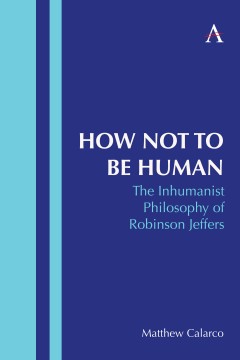How Not to Be Human
The Inhumanist Philosophy of Robinson Jeffers
By Matthew Calarco
Other Formats Available:
- About This Book
- Reviews
- Author Information
- Series
- Table of Contents
- Links
- Podcasts
About This Book
Current debates in the environmental humanities, animal studies, and related fields increasingly revolve around this question: What to do with “the human”? Is the human a category worth preserving? Should it be replaced with the post-human? Should marginalized and minoritarian groups advocate for a universal humanism? What is the relationship between humanism and anthropocentrism? Is a genuinely non-anthropocentric mode of thinking and living possible for human beings?
This book argues that the writings of twentieth-century poet Robinson Jeffers offer twenty-first-century readers a number of crucial insights concerning such questions and timely advice about how not to be human. For Jeffers, our tendency to turn inward on ourselves and to indulge in human narcissism is at the heart of the social, economic, and existential ills that plague modern societies. As a remedy, Jeffers recommends turning ourselves outward—beyond the self and beyond the human—and learning to affirm and even love the inhuman cosmos in all of its terrible beauty. In articulating this vision of “inhumanism,” Jeffers develops a full-orbed and radical non-anthropocentrism that stretches across ethical, political, ontological, and aesthetic registers. In the process, Jeffers helps us find our way back to ourselves, but this time no longer as “human” in the traditional sense but as plain members of the inhuman world. With his inhumanist philosophy and poetics, Jeffers not only anticipates the most pressing questions and cutting-edge debates of our present moment but also challenges us to reconsider some of the key dogmas that underpin familiar discourses surrounding the Anthropocene and posthumanist philosophies and ecopoetics.
Reviews
The book is appropriately cautious in pointing out ambiguities and potential dangers, and it also offers the reader a good sample of Jeffer's poetry. Jeffers's rewriting of Greek tragedies may be of special interest here. —CHOICE
“Lucid and reader-friendly yet imbued with philosophical gravitas, Matthew Calarco has written the perfect accompaniment to a growing twenty-first-century awareness of the poetry of Robinson Jeffers. Calarco shows that at the compassionate heart of Jeffers’s radical inhumanism is a bold demand, not just to understand the inhuman, but to learn to love it.” — Jeff Wallace, Professor Emeritus, Cardiff Metropolitan University, and author of Abstraction in Modernism and Modernity: Human and Inhuman (2023)
“Matthew Calarco’s How Not to Be Human is a timely conversation about what matters most—the individual’s relationship to society and human’s relationship to the more-thanhuman cosmos. Calarco invigorates Robinson Jeffers’s work with a philosophical vitality for our times.” — Dr. Ron Broglio, Arizona State University
“Calarco’s book is exciting, intriguing, and invigorating. The structuring of the book through the five major thematic lines—evil/theodicy, saviors, cosmos, humans, and values—worked really well and is a blessing and a gift to the reader.” — Jessica Pierce, Faculty Affiliate with the Center for Bioethics and Humanities, University of Colorado Anschutz Medical Campus
Author Information
Matthew Calarco is Professor of Philosophy at California State University, Fullerton.
Series
Table of Contents
Preface; Abbreviations of Works by Robinson Jeffers; Introduction: Between Poetry and Philosophy; 1. Evil; 2. Saviors; 3. Cosmos; 4. Human; 5. Value; Conclusion: Inhumanism; Suggestions for Further Reading; Index
Links
Stay Updated
Information
Latest Tweets



